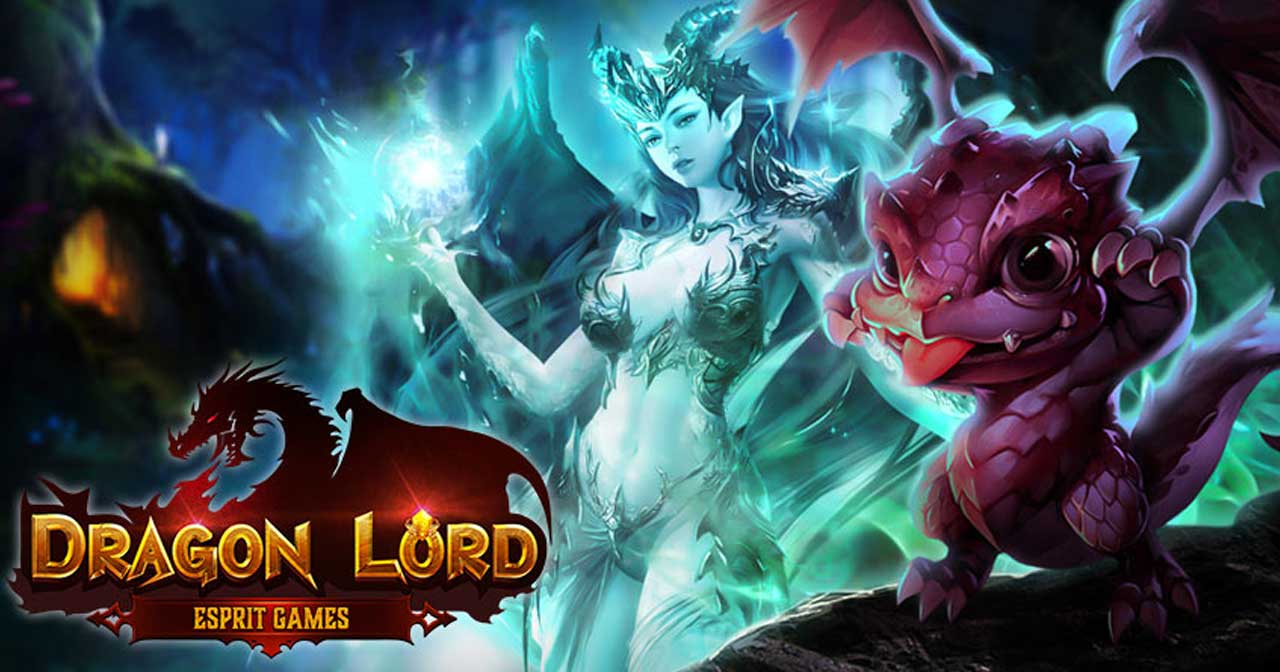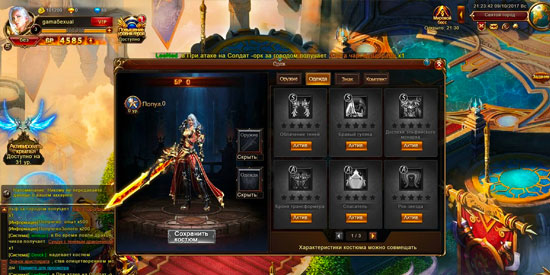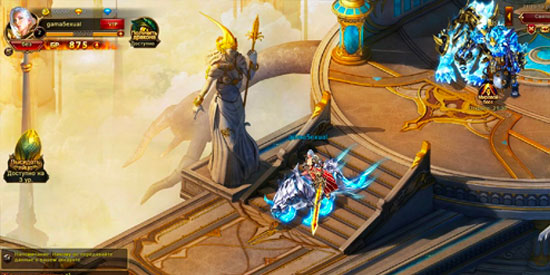
Dragon Lord
| Genre: MMORPG |
| Rating: |
Craving a fantasy game that actually lets you feel like a dragon-riding warlord, not just a background extra? Dragonlord might surprise you—it’s not flawless, but there’s something here that pulls you in.


First Impressions: Smoke, Fire, and Familiar Faces
The first few minutes in Dragonlord feel like opening an old fantasy novel—one that’s maybe a little over-the-top, slightly cheesy, but still kind of exciting. You’ve got soaring dragons, smoldering battlefields, and a UI that’s clearly trying to make you feel important. There’s a kind of nostalgic comfort in that. You’re not asked to fumble through obscure mechanics. Instead, the game holds your hand—sometimes a bit too tightly—and walks you through the basics with more fanfare than necessary.
Visually? It’s not AAA-level, but it’s got charm. There’s a definite browser-game vibe that fans of mid-2000s MMOs will recognize instantly. Characters have that glossy, hyper-detailed fantasy look—oversized weapons, questionable armor choices, and all. The dragons? Not too shabby. They don't just look good—they actually feel central to the world, not just slapped on the title screen.
What’s most striking, though, is how fast you’re pulled into the loop. Before you can say “wait, what’s my kingdom’s name again?” you’re upgrading buildings, recruiting heroes, and planning your first skirmish. It’s that classic one-more-click pull that’s tough to ignore. And yeah, it works.
The World Itself: Lore, Landscapes, and Those Winged Beasts
Here’s the thing—Dragonlord isn’t breaking any ground with its world-building. You’ve got your usual kingdoms at war, ancient dragons awakening, shadowy enemies lurking just beyond the map. If you’ve played any fantasy game in the last decade, this will all feel oddly familiar. But you know what? That’s not necessarily a bad thing.
There’s comfort in clichés when they’re done with some flair. The landscapes range from misty forests to scorched battlegrounds, peppered with dramatic castles and glowing crystals. It’s like someone took every cool location from a Dungeons & Dragons campaign and tossed them all in. Somehow, it kind of works.
What does stand out is how the dragons are integrated. They aren’t just flavor—they’re part of your progression, part of your strategy. You bond with them, grow them, fight alongside them. They even have their own development paths. And the game isn’t shy about making them feel epic. When you call one into battle, the camera slows just enough to let it sink in. That moment—just you, your dragon, and chaos below—feels like the payoff for sticking around.
Even the music helps a bit. There’s a dramatic orchestral score that swells during battles and quiets down while you manage your base. It’s not something you’ll hum later, but it keeps the mood intact.
Gameplay Mechanics: Battles, Building, and... Babysitting Your Troops?
Let me explain how this game hooks you. It starts with one simple upgrade. Then a resource collection. Then another hero to train. Before long, you’re knee-deep in battle formations and wondering if you should’ve researched that third-tier archery tech first.
Dragonlord is part builder, part strategist, part RPG—kind of like Clash of Clans had a baby with a turn-based fantasy battler. Combat is mostly automated, but it’s not mindless. Where you place your heroes, what abilities they have, and whether you time your dragon correctly—those things do matter. It’s not super tactical, but there’s enough there to make you think, “Okay, I could’ve done that better.”
Outside of battles, there’s a lot of base management. You’ll upgrade your stronghold, train troops, research tech trees, and gather resources. It’s the sort of rhythm you can fall into without realizing hours have passed. There's a satisfying loop of collect-build-battle-repeat, and honestly, it's kind of therapeutic in a weird way.
But here’s where it gets a little wonky: troop upkeep. Yeah, you actually have to manage food and resources to keep your army functional. It’s not hard, but it adds this layer of micromanagement that some folks will love—and others will find mildly annoying. It's a bit like keeping a garden alive in the middle of a war zone.
Progression: Slow Burn or Satisfying Climb?
Progression in Dragonlord walks a tightrope. Early on, you’ll feel unstoppable. Every click gives you something new—skills, gear, dragon buffs, power boosts. It’s dopamine on demand. But eventually, things slow down. That hero that used to level up every few battles? Now he’s stuck grinding XP. That next city wall upgrade? Gonna take a while.
But that’s kind of the point. The game wants you to settle in. There’s a cadence to it: fast early wins, then longer-term planning. And weirdly, it works. When you do finally level up that elite dragon skill, it feels earned.
Gear is a big part of progression too. Each hero can be outfitted with armor, weapons, artifacts—the works. Some of it’s cosmetic fluff, but some of it genuinely shifts how battles play out. And if you’re the kind of player who loves min-maxing stats, you’ll find plenty to sink your teeth into.
One thing worth mentioning: despite the game being called Dragonlord, the dragons don’t show their full potential right away. They grow with you—sometimes a little too slowly. But when they hit their stride? Oh man. Watching one wipe out half an enemy line never gets old.
Social Play: Alliances, Chats, and the Drama We Pretend to Hate
You know how some games make you feel like you’re in a vacuum? Like, sure, there are other players... somewhere. Not here. Dragonlord practically throws you into the community.
Alliances are more than just a checkbox feature. You’ll coordinate attacks, share resources, even hold territory together. It’s the kind of setup where teamwork really matters—and where you’ll see friendships form and rivalries explode. Sometimes over something as small as who forgot to reinforce the southern outpost. Again.
The chat system is decent—nothing groundbreaking, but functional enough. There’s global chat (chaotic, often hilarious), alliance chat (usually more civil), and direct messages. Occasionally you’ll see drama flare up—someone accusing someone else of poaching a farm node or stealing a kill. It’s all part of the chaos.
And honestly? That messiness is part of the fun. It makes the game feel alive. You’re not just building a fantasy empire—you’re part of a living, breathing player-driven world where what you do actually affects others.
Polish and Rough Edges: Let’s Talk Bugs, Glitches, and Random Charm
Let’s be real for a second—Dragonlord isn’t the most polished game on the planet. Sometimes the UI doesn’t quite respond the way you expect. Other times, tooltips are weirdly vague or missing entirely. And yes, occasionally, a dragon animation stutters like it’s had one too many.
But it’s not game-breaking. It’s just... noticeable. Like a well-loved paperback with a few pages dog-eared and a cracked spine. Slightly messy, but still readable.
There’s also a bit of jank that’s oddly charming. One hero’s voice line is so melodramatic it made me laugh out loud. The way some of the dragons strut across the screen like runway models? Completely ridiculous. And yet—I kind of love it. It reminds you this isn’t some ultra-serious war simulator. It’s a fantasy playground. Let it be weird.
Who’s It Really For? (And Who Should Probably Skip It)
So who’s going to love Dragonlord? Honestly, if you’re a fantasy fan who enjoys a mix of strategy and RPG elements, you’ll probably find a lot to like here. It’s for players who enjoy the process—not just the result. Who like tinkering with builds, talking smack in alliance chat, and seeing a strategy pay off five hours later.
It’s not for people who want twitchy action or instant gratification. This is a slow simmer game. A “check in while drinking coffee” kind of thing. If you want 15-minute bursts of adrenaline, you might bounce off this one.
It plays well both on desktop and mobile, so there’s flexibility there. And that helps. Whether you’re a night owl with a gaming rig or a casual player with a tablet, the game doesn’t lock you out of the experience.
Final Thoughts: Not Perfect—But Surprisingly Addictive
Dragonlord has rough edges. No doubt about it. The UI can be clunky, the progression curve wobbles, and the story leans hard on fantasy clichés. But you know what? It’s got heart.
The dragons actually matter. The alliances feel alive. And the core loop—the rhythm of building, battling, planning, and just existing in this world—is surprisingly satisfying.
You’ll log in for five minutes and stay for forty-five. You’ll start playing for the dragons and stick around for the drama. And if you’re anything like me, you’ll be thinking about that next upgrade while brushing your teeth at night.
So no, Dragonlord isn’t revolutionary. But it is worth your time—especially if you’re the kind of player who finds joy in the climb, not just the view from the top.